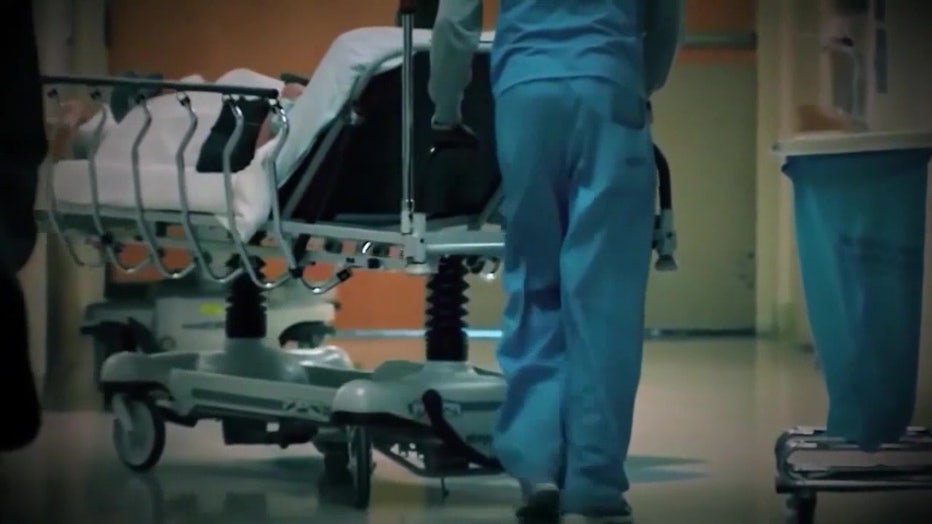Arizona reports over 100 coronavirus deaths amid signs of slowing

Health experts worried over current COVID-19 surge in Arizona
On Saturday, Arizona recorded 108 deaths and 2,742 additional COVID-19 cases, increasing the pandemic totals to 19,487 deaths and 1,064,346 cases. FOX 10's Irene Snyder reports.
PHOENIX - Arizona on Saturday reported over 100 additional COVID-19 deaths for only the second time since February even as several metrics showed some slowing in the pandemic’s current surge.
The 108 deaths and 2,742 additional confirmed virus cases reported Saturday increased the pandemic totals to 19,487 deaths and 1,064,346 cases, according to the state’s coronavirus dashboard.
The dashboard also reported that virus-related hospitalizations dropped below 2,000 for the first time in nearly three weeks, with 1,981 COVID-19 patients occupying hospital beds as of Friday, down from the current surge’s high of 2,103 on Sept. 11, according to the dashboard.
MORE: Coronavirus in Arizona: Latest case numbers
Meanwhile, Johns Hopkins University data showed drops in the seven-day rolling averages of daily new cases and of daily deaths over the past two week weeks.
The daily new cases average dropped from 3,152 on Sept. to 2,732 on Thursday while the daily deaths average dropped from 39.3 to 33.1 during the same period.
Hospitals struggle to care for patients
While vaccination rates were higher in the past couple of months with news of the delta variant spreading across the country, health experts say they have seen a drop in vaccinations, and they are a steady number of hospitalizations.
Will Humble, Executive Director of the Arizona Public Health Association, while cases among children are declining, adult hospitalizations remain fairly steady.
"Hospitals are struggling to meet the level of care for number of patients they have, because of unvaccinated adult patients," said Humble.
Currently, Arizona is averaging 10,000 vaccinations per day, according to statewide data. Earlier in the year, the state averaged 10,000 vaccinations per day, at each vaccination site.
"Over the last week, we see more people becoming infected with the virus than are getting vaccinated. That kind of puts it in perspective," said Humble.
Humble says while there are treatment options available for those who become hospitalized with COVID-19, like monoclonal antibodies, that form of treatment is not ideal.
"t's not a terrific clinical treatment to begin with. It needs to be given early on. The clinical guidelines are only for people with higher risk medical conditions, and it costs thousands of dollars rather than the vaccine that costs $15," said Humble.
Moving forward, Humble says the vaccine is the most effective option. However, he says the state still has a long way to go.
"At this rate, it is just going to take us a lot longer than it need to to put this pandemic behind us," said Humble.

MORE: Find COVID-19 vaccine locations in your area
In order to protect yourself from a possible infection, the CDC recommends:
- Avoid close contact with people who are sick.
- Avoid touching your eyes, nose, and mouth.
- Stay home when you are sick.
- Cover your cough or sneeze with a tissue, then throw the tissue in the trash.
- Clean and disinfect frequently touched objects and surfaces using a regular household cleaning spray or wipe.
- Cover your mouth and nose with a cloth face cover when around others
- Wash your hands often with soap and water for at least 20 seconds, especially after going to the bathroom; before eating; and after blowing your nose, coughing, or sneezing.
- Monitor your health daily
Symptoms for coronavirus COVID-19 include fever, coughing, and shortness of breath. These, of course, are similar to the common cold and flu.
Expect a common cold to start out with a sore or scratchy throat, cough, runny and/or stuffy nose. Flu symptoms are more intense and usually come on suddenly, and can include a high fever.
Symptoms of COVID-19 may appear more slowly. They usually include fever, a dry cough and noticeable shortness of breath, according to the World Health Organization. A minority of cases develop pneumonia, and the disease is especially worrisome for the elderly and those with other medical problems such as high blood pressure, obesity, diabetes or heart conditions.
RELATED: Is it the flu, a cold or COVID-19? Different viruses present similar symptoms
To protect yourself, wash your hands well and often, keep them away from your face, and avoid crowds and standing close to people.
And if you do find yourself showing any of these flu or coronavirus symptoms - don't go straight to your doctor's office. That just risks making more people sick, officials urge. Call ahead, and ask if you need to be seen and where.
More COVID-19 in Arizona news
- Senior COVID-19 advisor to Arizona Gov. Ducey details plan to get more people vaccinated
- Arizona Attorney General files lawsuit challenging President Biden's coronavirus vaccine mandate
- President Joe Biden's COVID-19 vaccine mandate plan elicits praise and scorn in Arizona
Tune in to FOX 10 Phoenix for the latest news
Download FOX 10 apps for local breaking news and weather
Sign up for FOX 10 email alerts, newsletters

